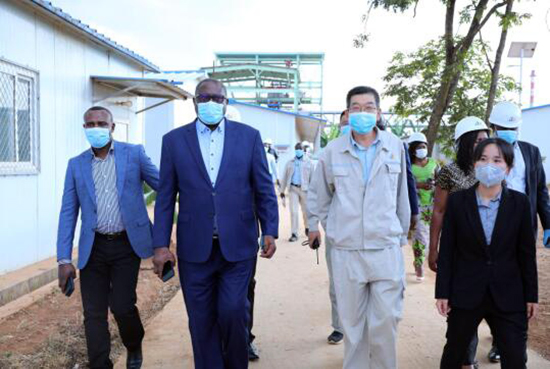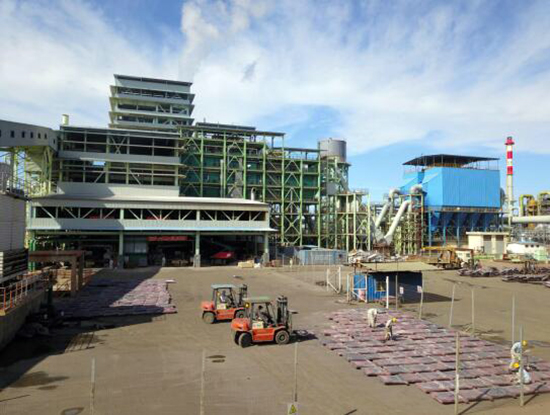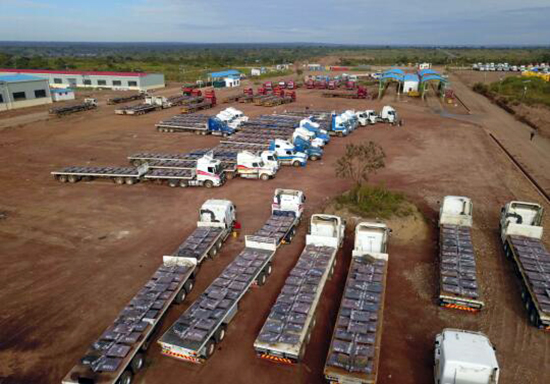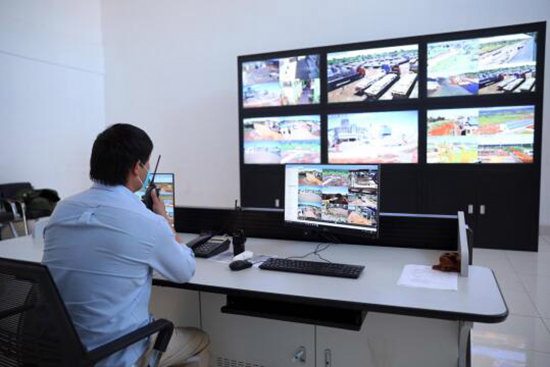LCS: Chinese and Congolese Employees Fight the Epidemic and Guarantee Production Together
29 May 2020
The virus respects no borders, and the epidemic knows no races. As COVID-19 spreads in Africa, the situation in the Democratic Republic of the Congo (“Congo”) is still grave. Lualaba Copper Smelter S.A.S. (“LCS”), a Congo-based company funded by China Nonferrous Metal Mining (Group) Co., Ltd. (“CNMC”), required both of its Chinese and Congolese employees to seriously follow the general anti-epidemic requirements of Wang Tongzhou, Chairman of the Board of Directors of CNMC and Chairman of the Holding Group, for “extensive closure, small-scale isolation, same rules, and joint efforts” and for “Two Stability, Two Aims, and Two Guarantees”. Practical actions were called to fight the epidemic and guarantee production.
All Lockdown: To Stabilize Local Safety and Solidarity
Congo discovered the first new case of COVID-19 on March 10, 2020. With the development of the epidemic, LCS decisively ordered “all lockdown” and imposed the strictest closed management to prevent transmission of imported cases.
But how to deal with the accommodation, medical care, food, and sanitation of nearly 1,000 Chinese and Congolese employees living in the industrial park? How to sustain production and operation? How to “stabilize local safety and solidarity” among the employees?
Fan Wei, Chairman of LCS, wrote A Letter to All Employees and Their Families on behalf of the company’s leadership, in which he informed them of the epidemic situation and called on everyone to work together to fight the epidemic and guarantee production. A chain of actions were taken at LCS: “Visiting Families of Grassroots Employees and Providing Them with Better Services”, soliciting stories about “Fighting the Epidemic Abroad”, monitoring the temperatures of employees, organizing emergency drill for epidemic prevention and control, and deploying on-duty security patrols. Resident forces were mobilized to build a “Cabin Community” with 64 units that could hold 512 Congolese employees. The community included a canteen, an infirmary, bathrooms, and a gym, with food, medicine, cleaning supplies, daily necessities and other anti-epidemic materials prepared for consumption of three months. Company leaders have visited the “Cabin Community” many times and strengthened and improved the anti-epidemic efforts in all aspects after finding problems and deficiencies in the epidemic prevention work.
In spite of the “lockdown”, everyone at LCS was united with one mind and all in this although they were physically isolated. Under the demonstration and guidance of company leaders, Chinese and Congolese employees reached a strong consensus on “guarding the door, managing people, keeping calm, and holding the bottom line of development.” In order to practically and steadfastly prevent the epidemic and guarantee production, 21 rules and regulations were developed and implemented at the company level, including the Work Plan for Stabilizing the Workforce and Management Measures for Access of Vehicles During the Epidemic Period (Trial); a work mechanism of “measuring temperatures three times a day, disinfecting every shift, inspect once a day, and holding a meeting once a week” and a supervisory mechanism of “maintaining zero case report every day, publishing briefing every week, and keeping supervision and reporting in real time” were implemented. When important officials from the Congolese Ministry of Mines and the Lualaba Provincial Government inspected the epidemic prevention work of the company, they praised LCS for always putting the safety and health of employees in the first place and for being an extremely responsible and caring enterprise.

Lualaba Provincial Governor inspecting the epidemic prevention work at LCS
Small-scale Isolation: To Remain Committed to Epidemic Prevention and Production
The sudden outbreak of the epidemic posed great difficulties and challenges on the construction and trial production of the project undertaken by LCS: 50% of the resident employees were dismissed; logistics for customs clearance was blocked; local materials were in short supply; incoming raw materials and product sales were impeded. With assigned responsibilities, the leadership of the company guided and urged their units to practise austerity and pursued staggered development. They prepared sufficient raw materials, spare parts, blow-in burden, and living materials in advance to ensure long-term continuous production of the copper smelting project. Functional departments of LCS visited epidemic stricken areas like Kinshasa, Kasumbalesa, and Lubumbashi, and made breakthroughs in tax breaks, raw materials organization, and opening up logistics channels for customs clearance. In spite of less workforce, Chinese and Congolese employees remained committed to epidemic prevention, actively adjusted the shift model, and resolutely took up the burden.
In order to overcome unfavorable factors such as shortage of hands, heavy tasks, and a sharp increase in workload, LCS fully intensified job skill training and assigned A/B candidates for key posts. Chinese and Congolese employees were flexibly deployed to meet production needs, and they were subject to arrangement, available around the clock, and fully devoted to work. The smelting branch carefully organized production and mobilized all that was possible to ensure production and copper output. The sulfuric acid branch accurately controlled process indicators and made the system flow efficient. The Equipment Management Department strengthened inspections in equipment locations, reduced failure rates, and exploited best performance in equipment. Integrated logistics personnel strengthened security protection and logistics support and provided thoughtful services. During the epidemic period, the production and operation of LCS bucked the trend, with record high productions of blister copper, sulfuric acid, and sulfur dioxide. The operating rate, the recovery rate and some other indicators have reached the best results since the project was put into production.
In order to overcome unfavorable factors such as shortage of hands, heavy tasks, and a sharp increase in workload, LCS fully intensified job skill training and assigned A/B candidates for key posts. Chinese and Congolese employees were flexibly deployed to meet production needs, and they were subject to arrangement, available around the clock, and fully devoted to work. The smelting branch carefully organized production and mobilized all that was possible to ensure production and copper output. The sulfuric acid branch accurately controlled process indicators and made the system flow efficient. The Equipment Management Department strengthened inspections in equipment locations, reduced failure rates, and exploited best performance in equipment. Integrated logistics personnel strengthened security protection and logistics support and provided thoughtful services. During the epidemic period, the production and operation of LCS bucked the trend, with record high productions of blister copper, sulfuric acid, and sulfur dioxide. The operating rate, the recovery rate and some other indicators have reached the best results since the project was put into production.

Well-organized production
Same Rules: To Seal Victory with Concerted Efforts
On April 24, nearby cities such as Lubumbashi successively saw confirmed cases of COVID-19, which exacerbated the pressure of epidemic prevention and control. The Lualaba Copper Smelting Project is the largest copper-cobalt pyrometallurgy enterprise in Congo. The fact that both the sources of raw materials and fuels and the sales of blister copper and sulfuric acid reply on foreign markets imposes more pressure on LCS than any enterprise of other types when it comes to epidemic prevention and production stabilization. In order to achieve the goals of “Three Fulls and Two Zeros” (“full staff coverage, full-process protection, full production guarantee, zero employee infection, and zero imported case”), LCS carried out self-inspection and self-correction seriously and was determined to make rectifications as soon as problems were detected in inspections.
Local employees had little awareness towards epidemic prevention and were unlikely to give up habits like hugging, shaking hands, and greeting suddenly. LCS intensified the efforts to popularize anti-epidemic knowledge by putting up anti-epidemic posters and slogans in public areas, and strengthened communication to help Congolese employees raise their awareness towards epidemic prevention; at the same time, LCS also distributed necessary protective equipment, supervised epidemic prevention work on a daily basis, exposed uncivilized behaviors in a timely manner, and urged Congolese employees to wash their hands and wear masks. These actions laid a solid foundation for epidemic prevention and control.
Incoming vehicles were the main source of epidemic transmission. At LCS, designated personnel would disinfect incoming vehicles and checked drivers for their implementation of anti-epidemic measures. Moreover, a 50,000-square-meter parking yard was built outside the factory wall, where incoming vehicles were put under isolation management to cut off the import channel of epidemic transmission. These determined efforts were made to realize the goals of “zero imported case” and “zero employee infection”.
To address the shortage of factory fences and other facilities during the construction period, LCS actively placed orders for local materials and acted quickly to have the purchased facilities installed. Resident Congolese employees volunteered to repair water and electricity facilities, clean the environment, make DIY fitness equipment, and improved the living conditions in the residential area. As a result, the Cabin Community took on a new look.
Local employees had little awareness towards epidemic prevention and were unlikely to give up habits like hugging, shaking hands, and greeting suddenly. LCS intensified the efforts to popularize anti-epidemic knowledge by putting up anti-epidemic posters and slogans in public areas, and strengthened communication to help Congolese employees raise their awareness towards epidemic prevention; at the same time, LCS also distributed necessary protective equipment, supervised epidemic prevention work on a daily basis, exposed uncivilized behaviors in a timely manner, and urged Congolese employees to wash their hands and wear masks. These actions laid a solid foundation for epidemic prevention and control.
Incoming vehicles were the main source of epidemic transmission. At LCS, designated personnel would disinfect incoming vehicles and checked drivers for their implementation of anti-epidemic measures. Moreover, a 50,000-square-meter parking yard was built outside the factory wall, where incoming vehicles were put under isolation management to cut off the import channel of epidemic transmission. These determined efforts were made to realize the goals of “zero imported case” and “zero employee infection”.
To address the shortage of factory fences and other facilities during the construction period, LCS actively placed orders for local materials and acted quickly to have the purchased facilities installed. Resident Congolese employees volunteered to repair water and electricity facilities, clean the environment, make DIY fitness equipment, and improved the living conditions in the residential area. As a result, the Cabin Community took on a new look.

Incoming vehicles under strict management
Joints Efforts: To Tide over the Crisis
During the epidemic period, there was also increasing pressure to keep the lives and property of employees safe. LCS quickly set up the Public Security Emergency Command Center, as well as the Public Opinion Monitoring and External Emergency Liaison Group, the Security Protection Group, the Emergency Vehicle Support Group, and the Emergency Negotiation Group. It also issued the Emergency Response Plan for Mass Events and Unexpected Public Security Events in the Company and the Notice on Strengthening Night Patrols in the Living Area During the Epidemic Period. An emergency plan for hierarchical responses was developed.
In order to enhance civil defense and technical prevention capabilities, a “Sky Eye” monitoring system was installed in the living area and the factory, and a 60-member night security patrol team, equipped with flashlights, batons, stab-proof vests, and intercoms, was established to effectively enhance security prevention and protection.
In order to enhance civil defense and technical prevention capabilities, a “Sky Eye” monitoring system was installed in the living area and the factory, and a 60-member night security patrol team, equipped with flashlights, batons, stab-proof vests, and intercoms, was established to effectively enhance security prevention and protection.

Providing stronger security protection with “Sky Eye”
LCS continued to enhance its joint defense and joint control capabilities, cooperated with local police stations, and deployed patrols around the industrial park day and night. It also followed external public security situation and internal public opinion information every morning and evening, actively strengthened contacts with the local government, the Chinese embassy in Congo, and local Chinese-funded enterprises, and improved its ability to coordinate at work and handle public security incidents; at the same time, it maintained closer contacts with Chinese medical institutions at home and in Congo to help it better respond to the epidemic under emergency.
On the evening of May 22, leaders of LCS in Congo led security personnel and all Chinese employees to launch an well-organized and orderly emergency response and assembly drill for the sake of public security, which effectively strengthened the emergency response and security protection capability of the company.
On the evening of May 22, leaders of LCS in Congo led security personnel and all Chinese employees to launch an well-organized and orderly emergency response and assembly drill for the sake of public security, which effectively strengthened the emergency response and security protection capability of the company.
By Huang Qingping and Zhou Qiong
News Center
Breaking news
China Nonferrous Mining Corporation was included in MSCI China Index
29 May 2020
China Nonferrous Mining Corporation Limited Successfully Implements Lightning Equity Placement, Raising HK$978 Million
29 May 2020
The Company Successfully Holds the 4th Regular Board Meeting for 2023
29 May 2020
The Company Successfully Holds the 3rd Regular Board Meeting for 2023
29 May 2020
The Company Holds Annual Shareholders' Special Meeting for 2023
29 May 2020

